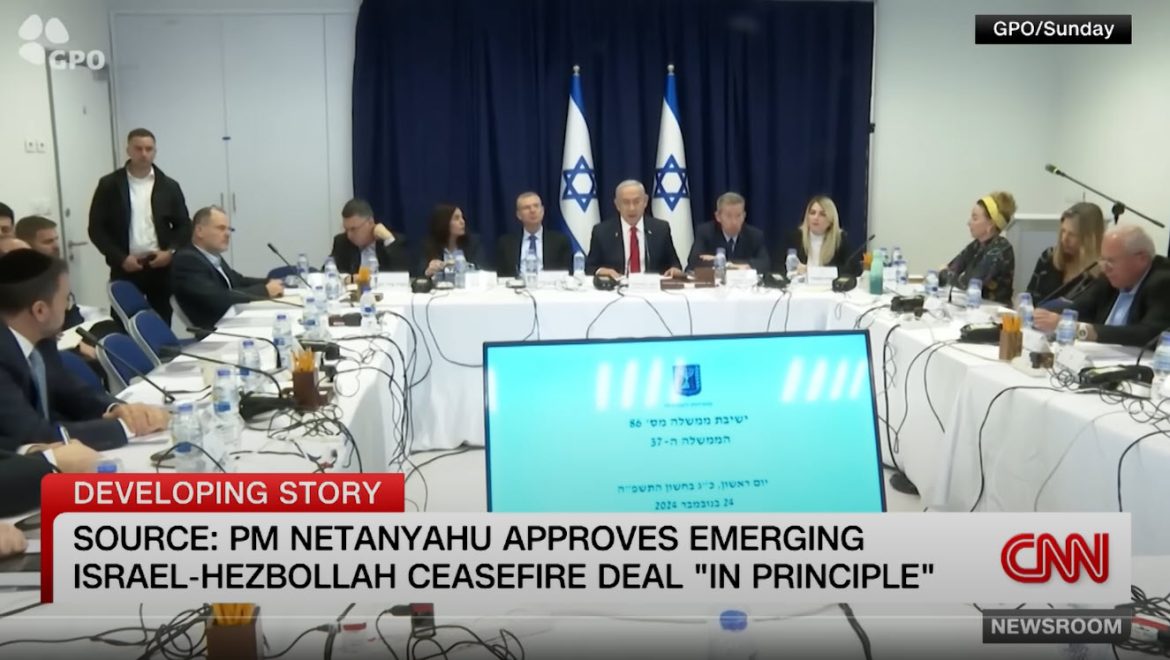Israeli Prime Minister Benjamin Netanyahu signals tentative approval of a ceasefire agreement with Hezbollah after a series of high-level security consultations. A source familiar with the discussions reveals that Netanyahu has agreed “in principle” to the terms of the emerging deal, which aims to de-escalate tensions along Israel’s northern border with Lebanon.
The proposed ceasefire comes after weeks of heightened clashes between Israeli forces and Hezbollah, the Iran-backed militant group. The conflict has raised concerns about the potential for a broader war, adding pressure on both sides to find a resolution. Netanyahu’s decision reflects a significant step toward reducing hostilities, though officials caution that finalizing the agreement will depend on further negotiations and adherence to specific conditions.
The deal reportedly includes provisions to halt cross-border attacks, dismantle newly constructed military positions, and allow for increased international monitoring along the disputed frontier. Israeli defense officials emphasize that any ceasefire agreement must prioritize Israel’s security, warning that violations by Hezbollah would result in immediate military retaliation.
In recent weeks, violence along the Israel-Lebanon border has intensified, with Hezbollah launching rockets into northern Israel and Israel responding with airstrikes targeting Hezbollah positions. The conflict has displaced communities on both sides and disrupted daily life in border regions. The international community, including the United Nations, has urged restraint and offered to mediate peace talks.
Netanyahu addresses the Israeli public, underscoring the importance of securing a ceasefire while remaining vigilant against future threats. He reiterates Israel’s commitment to defending its sovereignty and ensuring the safety of its citizens. Opposition leaders and security experts have expressed mixed reactions to the potential deal, with some praising the effort to prevent further bloodshed and others warning of the risks of trusting Hezbollah to honor its commitments.
President Biden announces a cease-fire agreement between Israel and Hezbollah, marking a significant step toward halting the conflict in Lebanon. The deal, brokered with the assistance of France, brings an end to weeks of hostilities that began after the October 7th, 2023, Hamas attack on Israel. Hezbollah, an Iran-backed militant group, has been engaged in clashes with Israeli forces within Lebanon, escalating regional tensions. The cease-fire aims to restore stability and prevent further violence, with international stakeholders expressing cautious optimism about the agreement’s potential to hold.
The ceasefire negotiations come amid broader regional tensions, as Israel continues to navigate its relationship with neighboring countries and contend with security challenges posed by Iran’s influence. Hezbollah’s role as a proxy for Tehran has heightened fears of escalating conflicts, particularly as Israel intensifies efforts to curtail Iranian military activity in Syria and Lebanon.
For now, the tentative approval of the ceasefire represents a glimmer of hope for stability in a volatile region. As both sides deliberate on the final terms, the world watches closely, hopeful that the agreement will hold and pave the way for a lasting reduction in hostilities.



